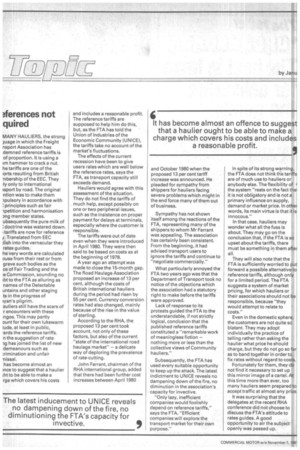Aerences not quired
Page 40

If you've noticed an error in this article please click here to report it so we can fix it.
MANY HAULIERS, the strong luage in which the Freight nsport Association has demned reference tariffs is of proportion. It is using a 1m hammer to crack a nut. he tariffs are one of the
torts resulting from British -nbership of the EEC. They ly only to international isport by road. The original ntion was to make them -rpulsory in accordance with : principles such as fair wetition and harmonisation Dng member states. ubsequently the pure milk of : doctrine was watered down. ; tariffs are now for reference (. Translated from EEC
ilish into the vernacular they rates guides.
he very words are calculated ouse from their rest or from grave such bodies as the ce of Fair Trading and the ;e Commission, sounding no ibt to the FTA as alluring as names of the Delectable untains and other staging ts in the progress of iyan's pilgrim.
auliers still have the scars of r encounters with these ,ngos. This may partly aunt for their own lukewarm :ude, at least in public, 'ards the reference tariffs. n the suggestion of rate lg has joined the list of new demeanours such as ;rimination and unfair
-nissal.
has become almost an !rice to suggest that a haulier 'fit to be able to make a rge which covers his costs and includes a reasonable profit. The reference tariffs are supposed to help him do this, but, as the FTA has told the Union of Industries of the Economic Community (UNICE), the tariffs take no account of the market's fluctuations.
The effects of the current recession have been to give users rates which are well below the reference rates, says the FTA, as transport capacity still exceeds demand.
Hauliers would agree with this assessment of the situation. They do not find the tariffs of much help, except possibly on one or two peripheral issues, such as the insistence on proper payment for delays at terminals, especially where the customer is responsible.
The tariffs were out of date even when they were introduced in April 1980, They were then said to be based on costs as at the beginning of 1978.
A year ago an attempt was made to close the 15-month gap. The Road Haulage Association proposed an increase of 13 per cent, although the costs of British international hauliers during the period had risen by 55 per cent. Currency conversion rates had also changed, mainly because of the rise in the value of sterling.
According to the RHA, the proposed 13 per cent took account, not only of these factors, but also of the current "state of the international road haulage market" — a delicate way of deploring the prevalence of rate-cutting.
John Farrant, chairman of the RHA international group, added that there had been further cost increases between April 1980 and October 1980 when the proposed 13 per cent tariff increase was announced. He pleaded for sympathy from shippers for hauliers facing severe problems which might in the end force many of them out of business.
Sympathy has not shown itself among the reactions of the FTA, representing many of the shippers to whom Mr Farrant was appealing. The association has certainly been consistent. From the beginning, it had advised transport users to ignore the tariffs and continue to "negotiate commercially."
What particularly annoyed the FTA two years ago was that the Department of Transport took no notice of the objections which the association had a statutory right to make before the tariffs were approved.
Lack of response to its protests guided the FTA to the understandable, if not strictly logical, conclusion that the published reference tariffs constituted a "remarkable work of meaningless fiction — nothing more or less than the collective views of Community hauliers."
Subsequently, the FTA has used every suitable opportunity • to keep up the attack. The latest indictment to UNICE reveals no dampening down of the fire, no diminution in the association's capacity for invective.
"Only lazy, inefficient companies would foolishly depend on reference tariffs," says the FTA. "Efficient companies will explore the transport market for their own purpose." In spite of its strong warning, the FTA does not think th'e tariffs are of much use to hauliers or anybody else. The flexibility of the system "rests on the fact thal it is not obligatory and is not a primary influence on supply, demand or market price. In othei words, its main virtue is that it is innocous."
In that case, hauliers may wonder what all the fuss is about. They may go on the conclusion that, if the FTA is so upset about the tariffs, there must be something in them aftel all.
They will also note that the FTA is sufficiently worried to put forward a possible alternative to reference tariffs, although only for a limited period. The FTA suggests a system of market pricing, for which hauliers or their associations should not be responsible, because "they would attempt to relate to costs."
Even in the domestic sphere, the customers are not quite so blatant. They may adopt individually the practice of telling rather than asking the haulier what price he should charge, but they do not go so far as to band together in order to fix rates without regard to costs.
Fortunately for them, they do not find it necessary to set up this mirror image of a cartel. At this time more than ever, too many hauliers seem prepared to accept traffic at almost any price, It was surprising that the delegates at the recent RHA conference did not choose to discuss the FTA's attitude to rates guides. A good opportunity to air the subject openly was passed up.












































